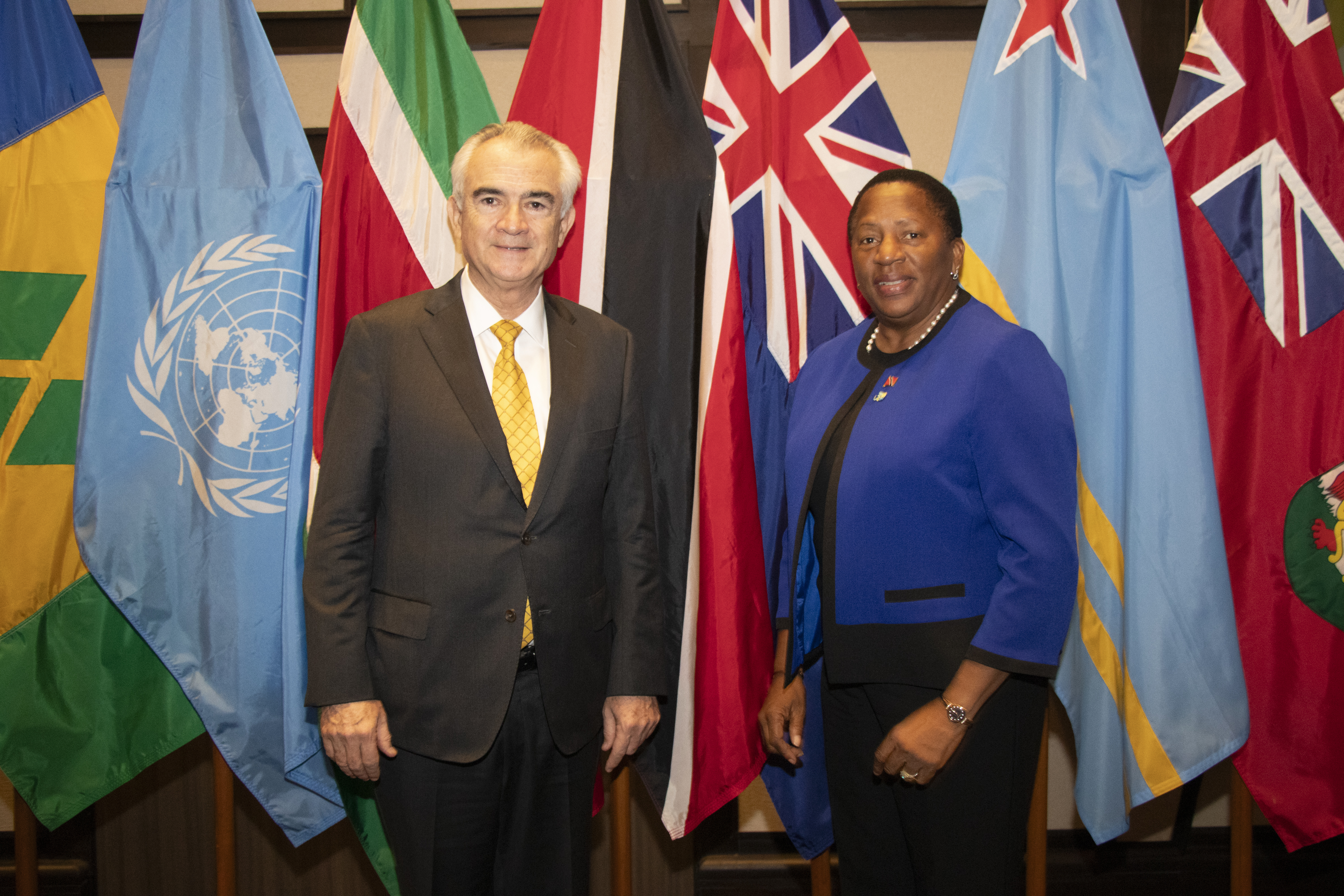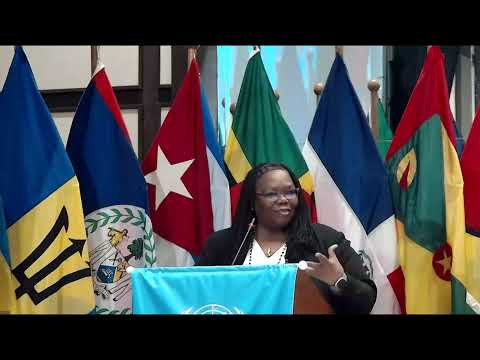ECLAC Executive Secretary: Road to Caribbean Sustainable Development not Easy, ECLAC Here to Support… T&T Elected Chair of Caribbean Development and Cooperation Committee
Work area(s)
In the 30th session of the Caribbean Development and Cooperation Committee (CDCC) Caribbean ministers, ambassadors and development specialists discussed solutions to pressing development challenges.

ECLAC Executive Secretary José Manuel Salazar-Xirinachs is warning that the road to sustainable development in the Caribbean is long and difficult, and is urging Caribbean countries, member States of the Caribbean Development and Cooperation Committee (CDCC) to make full use of the research and development support that ECLAC provides. ES Salazar notes that the Caribbean is on track to achieve only 20 per cent of the Sustainable Development Goals’ targets by 2030. He was speaking at the opening ceremony of the 30th session of the CDCC in Port-of-Spain, as Trinidad and Tobago’s Minister of Planning and Development Pennelope Beckles-Robinson takes over the stewardship of the Committee for the next two years.
Gathered at the 30th session of the CDCC were Caribbean ministers, ambassadors and development specialists discussing solutions to pressing development challenges.
ES Salazar notes that there are just over five years left to meet the 2030 Agenda. “The Caribbean has only 20% of its SDG targets on track for achievement; 33% moving in the right direction but too slowly for achievement, and 47% moving in the wrong direction. Furthermore, slow progress is recorded in sectors critical to your sustainable development like health and wellbeing, quality education and access to fresh water. And then there are those indicators that lack the data for us to properly measure progress at all, indicators on key issues like gender equality and climate action.”
He notes that an important part of ECLAC’s work and technical cooperation over the years has been support for accelerating SDG implementation. ECLAC, the secretariat of the CDCC, has supported Caribbean countries in drafting national sustainable development plans and science, technology and innovation plans, as well as providing a range of other research and development support. However, ES Salazar-Xirinachs says there is another reality that makes the work difficult.
“Data insufficiency presents a fundamental challenge to the accomplishment of a range of development imperatives: including to apply disaster risk reduction and response measures; and to ensure optimal use of the newly approved Multidimensional Vulnerability Index so that you can effectively make your case for greater access to concessional financing.”
As Trinidad and Tobago Minister of Planning and Development Pennelope Beckles-Robinson assumed the chairmanship of the CDCC, she pondered the climate crisis, a central theme of the discussions this week. “The crisis is not some distant threat; it is unfolding before our very eyes, wreaking havoc on our economies, ecosystems, and the livelihoods of our people… Since those unaffected by our peculiar circumstances are unlikely to effectively champion our cause, the obligation lies with us to affirm our right to equally benefit from the providence of this earth.”
Minister Beckles-Robinson continued, “Let this session ignite a renewed commitment among us to stand shoulder to shoulder with our fellow small island developing states, not just within our region, but across the globe. Together, we must confront the challenges before us and forge a path toward lasting, resilient prosperity.”
Outgoing Chair of the CDCC, Minister of Foreign Affairs, International Business and International Cooperation of Suriname Albert Ramdin also focused on climate change, noting that damage and loss efforts must be made a high priority for the Caribbean. Looking forward to the upcoming COP29 climate conference in Azerbaijan in November, Minister Ramdin said, “We cannot wait three or four years. The urgency is imminent… Regretfully, countries will have to be frank. Making promises and pledges is not helpful if we don’t deliver on them. I regret that I have to be so frank about it, but it is in the interest of all to make sure that the resources are directed towards the real needs.”
Trinidad and Tobago will chair the CDCC for the period 2024-2026. Also elected to the Bureau of the CDCC were British Virgin Islands, Jamaica and Saint Lucia as vice chairs and Saint Kitts and Nevis as rapporteur. The Caribbean Development and Cooperation Committee was established in 1975 and is in its 30th regular session.
More about ECLAC Caribbean
The mission of the Economic Commission for Latin America and the Caribbean (ECLAC) subregional headquarters for the Caribbean, is to deepen the understanding of the development challenges facing the Caribbean, and to contribute to solutions by conducting research and analysis and providing sound policy advice and technical assistance to Caribbean governments, focused on growth with equity and recognition of the subregion’s vulnerability.
Related event

Related content


ECLAC Executive Secretary: Reconceptualize Economy for Improved Growth and Sustainable Development in the Caribbean… SKN Prime Minister Envisions a Sustainable Island State
The Eighth Caribbean Development Roundtable (CDR) was inaugurated in Port-of-Spain, Trinidad and Tobago, on Monday 9 September, 2024.

Thirtieth session of the Caribbean Development and Cooperation Committee (September 11, 2024)
Thirtieth session of the Caribbean Development and Cooperation Committee (September 11, 2024). Port of Spain, Trinidad and Tobago. More information in
Subregional headquarter(s) and office(s)
Country(ies)
- Caribbean
Contact
ECLAC Caribbean media
- spou-pos@un.org
- 868 708 1769
